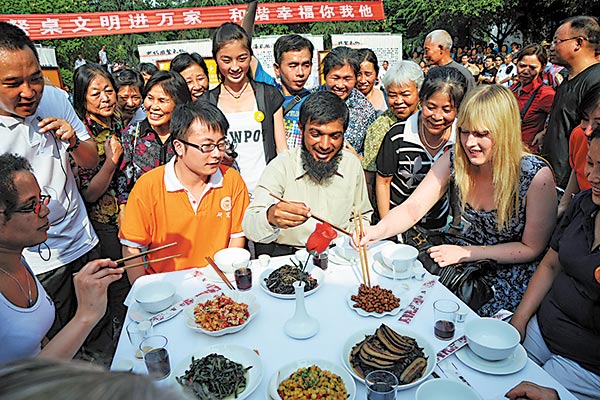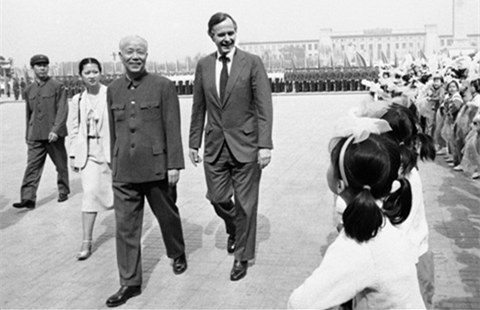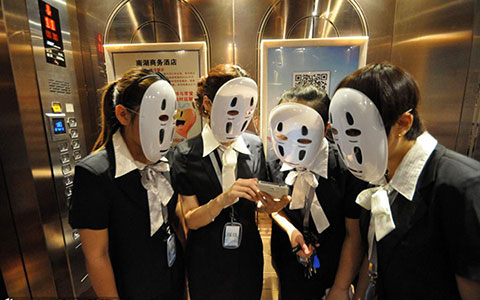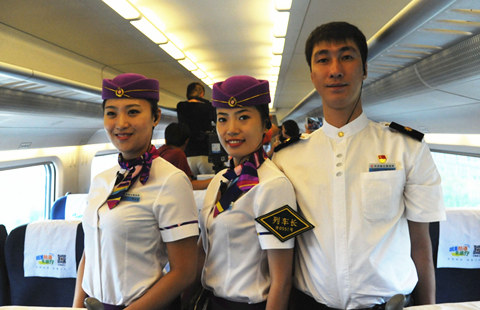Unraveling the mystique of the Chinese banquet
Updated: 2015-07-17 07:44
By Chen Yingqun(China Daily)
|
||||||||
 |
|
A lesson in Chinese dining etiquette and the use of chopsticks in Chongqing.[Photo provided to China Daily] |
Like many foreign businesspeople in China, John Bruijnooge knows there is much more to a Chinese banquet than just sitting down for a meal.
"There are a lot of unwritten rules, many I don't know about," says the Dutch executive, who regularly attends dinners with government officials and corporate executives around China.
"I want to know how to behave so I can improve my relationships," he says. "I'd really regret it if I made a big mistake and damaged a relationship."
To prevent that happening, Bruijnooge paid 2,500 yuan ($410) in May to attend a one-day course at Institute Sarita, a private finishing school in Beijing.
Founder and principal Sara Jane Ho says dozens of Western executives have turned to her school's etiquette classes to learn the art of surviving a Chinese business banquet.
Of all the customs, she says, "the way people toast each other is definitely the most confusing and yet intriguing for Westerners".
In the West, people tend to stay seated during a business dinner, often because the seating has been arranged so the "right people" will have the chance to converse, Ho says. But in China, as soon as the first dishes arrive, people stand up, take a drink in hand and start to toast other guests while walking around the room.
"It's very disconcerting for foreigners," she says.
"They're not sure if they should be doing the same thing, who they should toast, when they should toast, and what they should say, or whether they should drink seated or standing up. It's where foreigners feel most uncomfortable.
"Chinese businesspeople are nervous about Western business lunches, but Westerners are equally nervous about Chinese business banquets."
Ho founded Institute Sarita in 2013. A former student of Institut Villa Pierrefeu, a finishing school in Switzerland, as well as Harvard Business School, she speaks five languages and has lived in as many countries.
The original aim of the school, she says, was to offer courses to the Chinese elite on international etiquette and protocol such as Western table manners, business etiquette and what clothes to wear.
The idea of advising foreigners on Chinese dining customs came up two years ago, when a senior executive at Cisco Systems asked for etiquette training.

 World's first figure 8 Ferris Wheel to be opened in Macao
World's first figure 8 Ferris Wheel to be opened in Macao
 Heavy downpour hits SW China
Heavy downpour hits SW China
 Wan Li: A life in photos
Wan Li: A life in photos
 22 World Heritage Sites in China along the Silk Road
22 World Heritage Sites in China along the Silk Road
 A day of masks
A day of masks
 France celebrates Bastille Day
France celebrates Bastille Day
 China's northernmost high-speed railway enters trial operation
China's northernmost high-speed railway enters trial operation
 Eight industries the shared economy will transform
Eight industries the shared economy will transform
Most Viewed
Editor's Picks

|

|

|

|

|

|
Today's Top News
China's GDP grows by 7%
Japan passes disputed bill
Petcoke called key in pollution fight
Service sector bolsters China’s GDP despite stock woes
Bush, Clinton dominate early presidential fundraising
Tiny Pluto sports big mountains, New Horizons finds
Greek parliament approves debt deal and first reforms
China's Internet giants reprimanded over obscene clip
US Weekly

|

|






